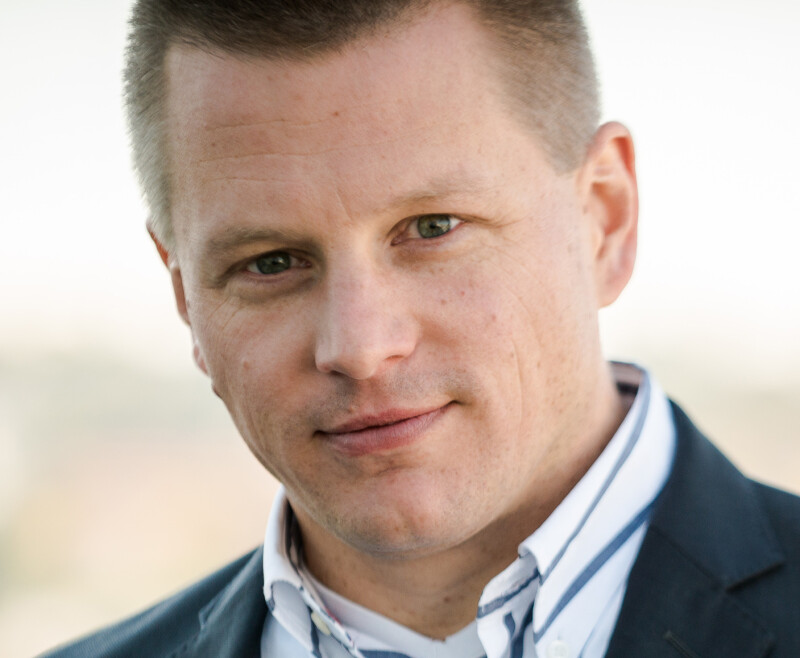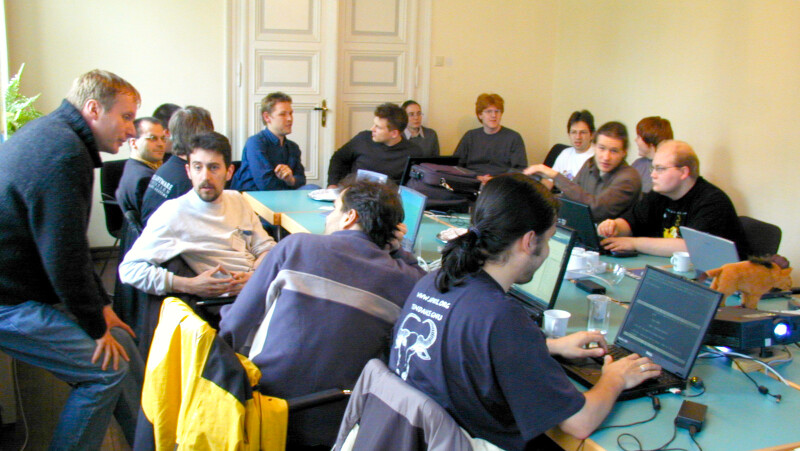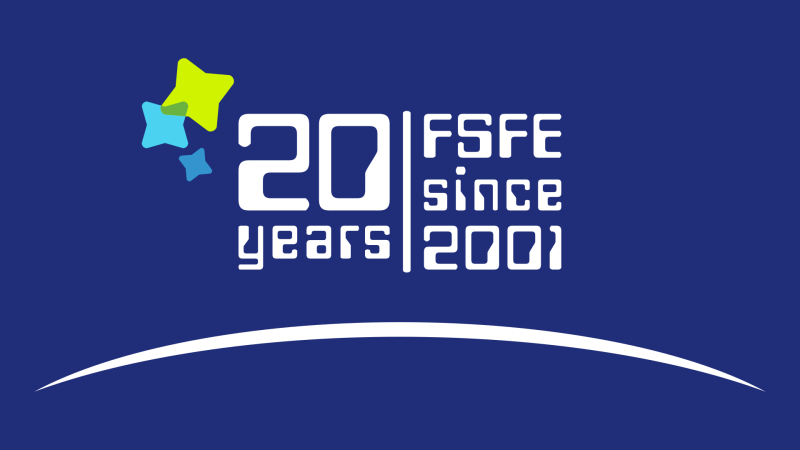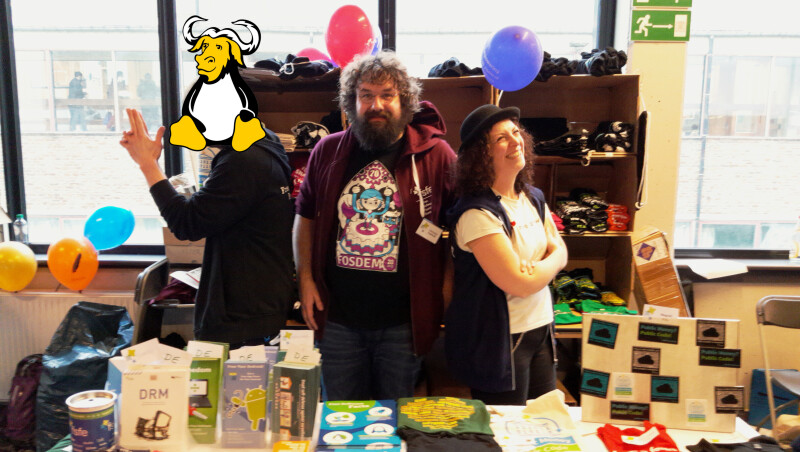20 years FSFE: Interview with Georg Greve, founder president
In 2021 the Free Software Foundation Europe turns 20. A moment that we like to use to celebrate our community and who has accompanied us in the past or still does with a series of publications. In our first publication we look back where everything got started and conducted an interview with the FSFE's first president Georg C. F. Greve.
It was Georg Greve who in April 2001 handed all necessary documents to the notary in Hamburg, Germany, to officially register the association "Free Software Foundation Europe". Which was only the last official step after many weeks of preparation and strategy meetings beforehand. Neatly with the official registration, Georg Greve became the first President of the newly founded FSFE and led the organisation in a full-time capacity until June 2009. On 18 December 2009 Georg Greve was awarded the Federal Cross of Merit on ribbon by the Federal Republic of Germany for these years and his achievements in Free Software and Open Standards.
20 years later we interview Greve about the creation of FSFE, his first days in office and how it evolved from there.
Interview with founding president Georg Greve
FSFE: Can you please tell us how everything started: When and why was the idea born to create the FSFE and how did it go from there to its offical registration in April 2001?
Georg Greve: Having been fascinated by technology and its ability to shape our daily life, I got involved in the GNU Project around 1995 when Richard Stallman discovered a small program that I had written. A few years later while writing the Brave GNU World it became clear to me that we needed something like the FSFE for a variety of reasons. On the one hand the European scene in Free Software had become really strong, perhaps even dominant at the time. But its culture and its approaches hadn't really registered with the majority of US organisations.

Portrait of Georg Greve, founder president of FSFE
Perhaps even more importantly there was an evidently growing disconnect between the analysis on which the US organisations had been built, and the reality of technology adoption and usage. The world evolves very fast, which means that an answer which was perfectly on point two years ago may be completely out of place today. The principles do not change, but the pace of change necessitates that our answers to today's challenges based on those principles must sometimes co-evolve with a similar pace. I felt we needed a more dynamic, evolving organisation than what I had seen so far. One that can embrace and live change, and one that can come up with the right answers for the current time continuously.
So in order to start FSFE I reached out to Richard who put me in touch with a couple of people he trusted and thought up to the task of creating the first Free Software Foundation outside the US. Over a couple of months we started discussing first internally and later pitched the idea to the public. Afterwards it all moved rather rapidly and it took only a few months until we had the organisation off the ground.
How was it in the first months and years to start working and lobbying as a not-before-existing pan European civil society association that at the same time came with a kind of historic heritage from a pre-existing Free Software community? At what point have you been sure that the FSFE has been made to stay?
The first years were rather tumultuous. It became self evident very quickly that this organisation needed someone to dedicate themselves fully to the task. The others felt that I would be the right person for the job and I would have regretted not having given this my best shot. So out of my small one room flat in Hamburg I started working full time for FSFE, an organisation that started to win some crucial first supporters, but was still far from being able to pay a normal salary.
Georg Greve speaks on a rally against software patents during Linuxtage Berlin 2004. CC-BY Hans Joachim-Baader
Those early days had existential threats almost every week, and more than once it seemed we had bit off more than we could chew. Between Microsoft requesting that we pay their court fees on the European Antitrust Case, which the court fortunately rejected, to struggles with those who felt we should take a more "canonical" approach and just follow the leader, the time held plenty of excitement. But it was also very educational.
I had the privilege to have some truly outstanding people by my side from the start and discover so many more throughout the years.
And we got to basically create our own play book on several topics, including how to build support for Free Software in many traditional industries, national governments and both the European Commission and the United Nations. That work has been intensive, with many long nights, and fraught with complexity. But also very rewarding because tiny adjustments to this enormous lever can bring such profound changes.
So these years can be described as many things, but boring they were not, and I had the privilege to have some truly outstanding people by my side from the start and discover so many more throughout the years.
As to when I was convinced that FSFE was here to stay? Probably when I stepped down and the organisation continued to function and grow. That to me was the test that I had managed to build an organisation that was not dependent on me alone, and would survive my passing. This was what we had set out to do in 2001, and in 2009 it was clear that indeed we had achieved that goal.
What is your personal highlight that the FSFE has achieved during your presidency?
There have been so many highlights and special moments that come to mind. I vividly remember when the European Court of Justice had ruled in our favour. Together with Jeremy Allison and Carlo Piana we found ourselves back in the hotel doing a podcast for Groklaw. I think the excitement of those moments comes out rather clearly. The first time we took the floor at the United Nations and found our positions taken up by other participants. There are so many moments big and small all the way to a deeply touching farewell back in Spain.
In the end, what stands out more than anything else is all the people. It is deeply humbling when someone takes time out of their own life to spend a weekend in a city helping set up the booth, spending countless hours talking to people and answering questions. And all the supposedly small tasks people have done, even if it is "just" translating a single web page.
It is that support and the sense of working together for a shared goal that stands out more than anything.
In all the years that you have been President of the FSFE, what did you like most about the association and its community?
To me what stands out more than anything is probably the passion and conviction of the community. It's the special vibe of a comparatively small group that shares a common goal, even though sometimes it may not seem that way. There is enormous diversity in opinions. Technology is a universal tool, so the people in the Free Software community are naturally a subset of a very diverse society with sometimes quite different fundamental opinions about life.

A lot of action during the very first General Assembly of the FSFE on 6 May in 2001. Picture CC-BY-SA 4.0 Peter Gerwinski.
So we had fans of Berlusconi - who today would likely be fans of Trump - sitting alongside former communist group members discussing constructively what it would take to make Free Software succeed across all of society. That at times took a great deal of tolerance, as well as wisdom to avoid topics that would only serve to splinter the group and distract from the mission that FSFE was founded for, which was all about software freedom.
To me what stands out more than anything is probably the passion and conviction of the community.
There have always been attempts of certain political streams in society to make Free Software their own. But we always made an active effort to not let any party or social movement influence the group too much and sought balance by actively reaching out to the opposite part of the political spectrum for as long as it was clearly driven by rational thought, the scientific method, and democratic principles. That's not been terribly easy, either, and is hardly ever black and white, but the result was a community that is very rich in opinions and perspectives.
I firmly believe it is healthy to be confronted with opinions that otherwise you would not find in your social circles and filter bubbles.
Looking back what was the most important thing you learnt from your work at the FSFE?
My time with FSFE has blessed me with a lot of great experiences and opportunities. When working with such an incredible number of extremely smart people across so many cultures it is basically impossible not to learn something each day. And while there was a lot of technology, most learning was in politics, social science, economics but also personal development. My background is in Physics because it was the best foundation to my ideal of the universal science education I was seeking. Understanding what makes this world tick has been a fascination of mine for as long as I can remember.
The most important lesson is perhaps the simplest. There is almost no limit to what can be achieved as long as there is relevance, timeliness and focus. While it sounds like a platitude, the true challenge is in actually applying it. There are so many worthwhile and good things that one should do that it is terribly easy to get distracted. Simultaneously, relevance is a function of the world around us, and since work takes time it is a function of the world we're heading toward, not the world we're seeing today. But look too far ahead and you may run out of steam, patience or support before that change has happened.
And to be perfectly honest I'm still trying to learn how to apply that lesson myself.

Volker Dormeyer, Werner Koch, Marcus Brinkmann and Georg Greve (from left to right) at the "FSF Europe" booth in 2001 during FOSDEM. (CC-BY-ND 3.0 by Oliver Berger/Free Software Foundation)
And what is a story that still makes you laugh or smile when you remember it?
Those were crazy years, and we laughed a lot.
Like when kyrah came to the Vienna General Assembly in the morning and told us she had been dreaming that Reinhard ate one of our assembly members, only to be told off by me that this is strictly not allowed. Apparently she had been traumatised by last night's events when Reinhard finished everyone's enormous Schnitzels - an event that earned him the honorary title of "Schnitzelmonster." In true Reinhard fashion he carried this title with dignity and even turned it into a legendary song that we sung together in years to come.
There were so many moments we all broke down with hysterical laughter. In hindsight I think it was our ability to laugh together that made it such a special time. Black humour, not taking yourself too seriously, and a good amount of self irony were certainly always appreciated and I believe them all to be virtues even today.
As a last question, what do you wish the FSFE for the next 20 years?
It is my personal belief that people should reinvent themselves to some extent every 10 years or so. For organisations that time is around 20 years. FSFE was founded when FSF was approaching its 20 year anniversary. It was a rejuvenation from the outside. My wish is that FSFE manages to rejuvenate itself from the inside.
The world has changed so much since we started back then. Relevance today will be based on very different parameters and needs to include answers to shifts like decentralised finance, self-sovereign identity, and the internet of things. All of these change the basis on which our world functions and the way in which people interact with technology. Especially the "old guard" in community has for instance traditionally held a certain disdain and arrogance toward blockchain either as a buzzword that's slapped onto things to fool investors and has no other justification, or as a play thing of morally corrupt high frequency traders or speculators.
And while I myself have been foolish enough to hold that viewpoint at some point in my life, I am convinced today that it is fatal to relevance to still hold on to those convictions today. Same for identity, which has been undergoing dramatic changes, driven by its centralisation in the hands of GAFA. This is something we saw coming, along with the dangers of social media. But that wave swallowed everyone whose answer was "Just say no." It did not work for Reagan, and it not work for the Free Software community - and our own positive answers lacked conviction, relevance and scale.
What I wish FSFE is the courage to be brave, diverse, controversial and tolerant in the years to come.
To brutally exaggerate and oversimplify: FSFE now has the choice to rest safely on its knowledge of moral superiority and the knowledge we'll be able to tell people we told them so when they get burned in future. Or it can boldly go where no Free Software organisation has gone before and actively embrace and tackle these topics to which we should already have answers.
So what I wish FSFE is the courage to be brave, diverse, controversial and tolerant in the years to come.
Because society needs a voice that is independent and with well thought out opinions on these crucial transformations that are happening today.
FSFE: Thank you very much!
About "20 years FSFE"
In 2021 the Free Software Foundation Europe turns 20. This means two decades of empowering users to control technology.

Turning 20 is a time that we like to take a breath and to look back on the road we have come, to reflect the milestones we have passed, the successes we have achieved, the stories we have written and the moments that brought us together and that we will always joyfully remember. In 2021 we like to give momentum to the FSFE and even more to our pan-European community. The community that has and always will form the shoulders on that our movement relies on.
20 years of FSFE is meant to be a celebration to everyone who has accompanied us in the past or still does. Thank you for contributing your piece of the puzzle that shapes the FSFE and setting the foundation for the next decades work of the movement for software freedom.
Support FSFE

 FSFE FOSDEM booth
FSFE FOSDEM booth
 Portrait of Georg Greve, founder president of FSFE
Portrait of Georg Greve, founder president of FSFE
 A lot of action during the very first General Assembly of the FSFE on 6 May in 2001. Picture CC-BY-SA 4.0 Peter Gerwinski.
A lot of action during the very first General Assembly of the FSFE on 6 May in 2001. Picture CC-BY-SA 4.0 Peter Gerwinski.
 Volker Dormeyer, Werner Koch, Marcus Brinkmann and Georg Greve (from left to right) at the "FSF Europe" booth in 2001 during FOSDEM. (CC-BY-ND 3.0 by Oliver Berger/Free Software Foundation)
Volker Dormeyer, Werner Koch, Marcus Brinkmann and Georg Greve (from left to right) at the "FSF Europe" booth in 2001 during FOSDEM. (CC-BY-ND 3.0 by Oliver Berger/Free Software Foundation)

 Let's celebrate #ilovefs day!
Let's celebrate #ilovefs day!
 Show your love for Free Software, #ilovefs
Show your love for Free Software, #ilovefs